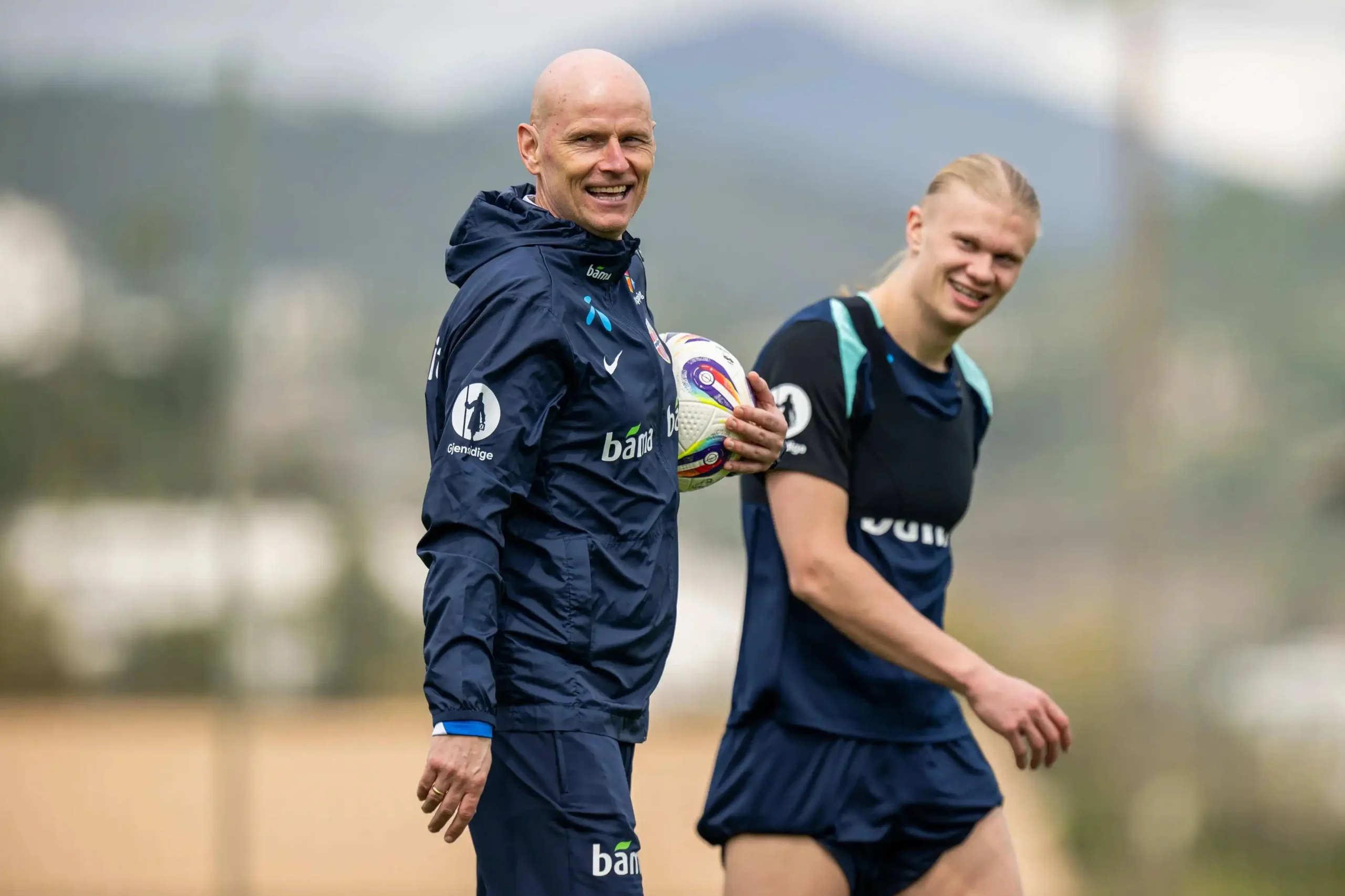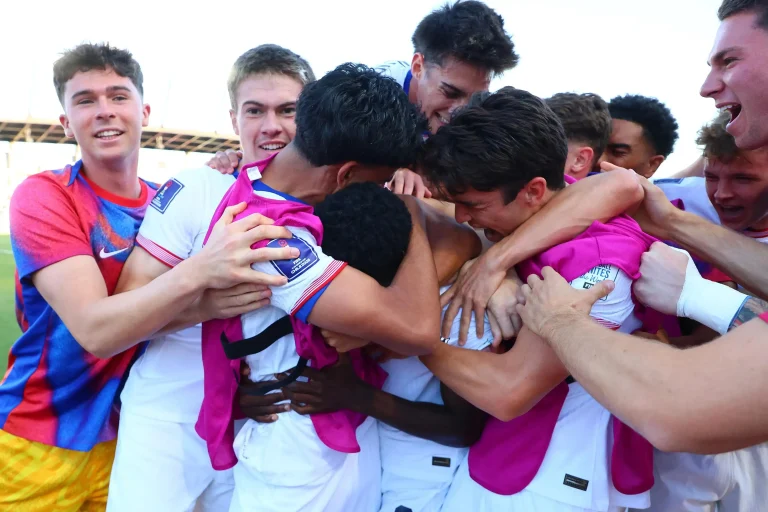The final whistle had long since sounded and rain was teaming down with the relentless ferocity it had all evening, but Oslo’s Ullevaal Stadion was still packed to the rafters.
Norway had just steamrollered Italy 3-0 in a FIFA World Cup 26™ qualifier, and the mood was ebullient as the home fans serenaded their heroes. For coach Stale Solbakken, it was a scene which encapsulated the nationwide excitement surrounding his team.
“People didn’t want to go home,” he said. “The rain was pouring, but they were there long before the game and long after the game.”
Three days after that statement victory in early June, Norway edged Estonia 1-0 to make it four wins from four games in UEFA qualifying Group I. They are firmly on track for a return to the World Cup for the first time since 1998, when midfielder Solbakken was part of a side which reached the Round of 16 in France. The 57-year-old described competing at the global finals as “a special time”, but is not one for dwelling on the past.
“We are sick and tired of talking about that now, so we need to get to another tournament,” said Solbakken, who was also in the Norway squads at USA 1994 and UEFA EURO 2000. “We are only halfway through qualifying, but obviously it will be a big, big thing in Norway (if we can reach World Cup 26). It’s 25 years since we’ve been in a major tournament, so it’s about time.”
An energetic and technically gifted attacking midfielder in his playing days, Solbakken made 58 appearances for Norway. He retired from international football in 2000, but was still going strong at club level one year later when his life was turned upside down. During a training session with FC Copenhagen, Solbakken collapsed and his heart stopped beating for almost seven minutes before he was revived by the club doctor.
“He was clinically dead,” the doctor later said. “It is a miracle that he is still alive.”
He was rushed to hospital and in a coma for 30 hours before regaining consciousness. Solbakken, it transpired, had an undetected heart defect which caused the medical episode. He was fitted with a pacemaker and forced to call time on his playing career.
“Obviously, things like that change you a little bit, especially in the short term,” Solbakken said. “But I haven’t had any problems since then and it’s been taken good care of. My health has been really good, so I think I’ve been lucky. Many have not been that lucky. It also led me into coaching maybe at an earlier stage than others.”
Indeed, in 2002 a 34-year-old Solbakken took on his first senior head coaching role with Norwegian second tier club HamKam. He has gone on to enjoy a distinguished career in the dugout, enjoying his most significant successes with Copenhagen, who he led to eight league titles across two spells with the Danish side.
Solbakken was appointed Norway boss in 2020, moving into the international scene after almost two decades coaching at club level. He has steadily shaped a formidable side, and their trouncing of Italy offered the most compelling evidence yet of their sky-high potential.
Norway’s flawless World Cup qualifying campaign to date has been powered by an explosive attacking line spearheaded by Manchester City superstar Erling Haaland. They can also call upon the likes of Arsenal playmaker Martin Odegaard, Atletico Madrid’s hulking frontman Alexander Sorloth and RB Leipzig’s flying winger, Antonio Nusa.
Solbakken’s side have scored more times than any other nation in UEFA qualifying, netting 13 times during their four matches to date.
“Offensively, we have players with some X factor now,” Solbakken said. “We feel we can always score a goal. As a team, we have become much more solid defensively as well. We have a better mix. I think we have had three perfect games – Estonia was a little bit more difficult for us – but we are in a good flow at the moment. The feeling (in the squad) has always been good, but there’s an extra edge to it now that we have done so well.”
In Haaland, Norway boast one of the most feared strikers of his generation. Aged 25, he is already the nation’s all-time leading marksman having struck a barely credible 42 goals in 43 games for his country. Solbakken explained how providing service for Haaland is a key priority, while also paying tribute to his No9’s humility and work-ethic.
“The other players know that Erling is our biggest match-winner and that we have to make sure that we put him in the right areas so he can score goals and be dangerous. Erling is easy to coach. He very down-to-earth in terms that he wants to do his work defensively as well. He thinks about the team before he thinks about himself. You can see that when other players score, he’s as happy as he is when he scores himself. He’s aware he’s a leader and he’s taking care of his team-mates in a very good way.”
Those qualities convinced Solbakken to select Haaland as his vice-captain. Norway’s regular skipper is Odegaard, and Solbakken outlined how the 26-year-old’s football intelligence is matched by his impressive maturity.
“Martin is not a screamer,” he said. “He doesn’t speak very loudly, but when he speaks it’s always common sense. He’s very good with both young and older players. His understanding of the game is second-to-none. He is a very wise person on and off the pitch.”
Haaland and Odegaard may be the headline-grabbing names in Solbakken’s squad, but they are supported a cast of players performing in Europe’s top leagues. Why has the country produced so many excellent footballers in recent years?
“There’s been a lot of hard work in youth systems all around the country,” said Solbakken. “And obviously, in a little country like Norway, there will always be periods where you have a lot of players in one position and not so many in other positions. Now we are blessed with more offensive players than defensive players. In the ‘90s, when I played, it was the opposite. So, we still have to make sure that we produce good defensive players and that we don’t underestimate the physicality in some players. Maybe players that aren’t as good with the ball also need to get their education longer so we can produce some physically good defensive players.”
At senior national team level, Solbakken opened up how he has set about cultivating an environment where his players can flourish.
“First of all, it’s about creating a culture where everyone feels good,” he said. “I think we have managed to do that also when we have had some tough times. The culture has always protected us from the noise outside and we have been very strong together. The second part is to produce a team where the players feel that they are comfortable with the playing style and that they can express themselves, but also that they need to dig deep, put any ego to the side, and make sure the team is the main thing.”
That collective ethos has been on show throughout World Cup 26 qualifying. Norway are six points clear at the top of Group I and will be out to sustain their perfect record when they host Moldova on 9 September.
The Norwegians have set the bar high with their exceptional performances and results of late, but the growing weight of expectation does not faze their steely, level-headed coach.
“There’s always pressure in these jobs, but you have to live with that, and it doesn’t really bother me,” said Solbakken. “I look forward to every time we’re going to meet up because we really like working together.”



